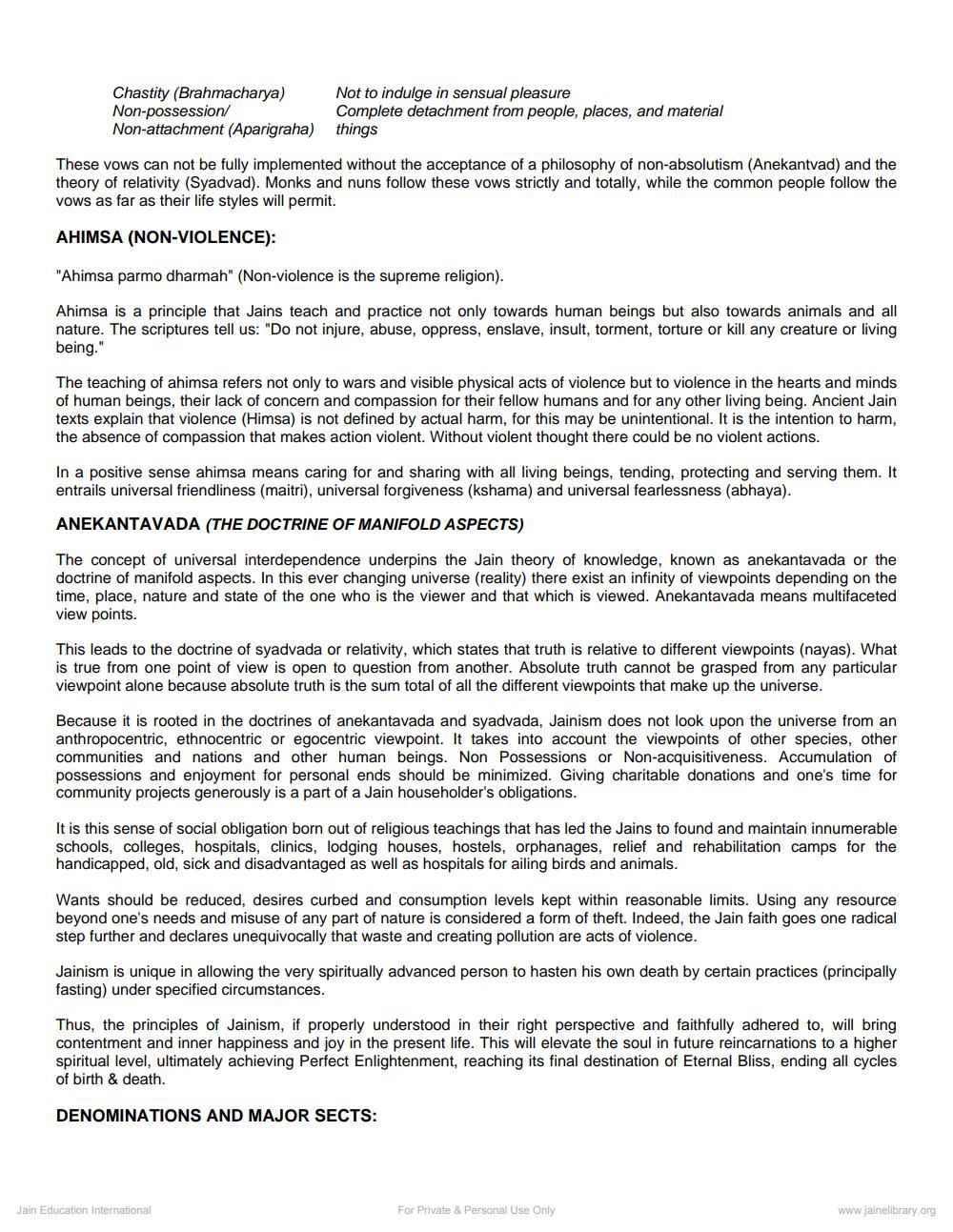Book Title: Jainism Author(s): Pravin K Shah Publisher: JAINA Education Committee View full book textPage 3
________________ Chastity (Brahmacharya) Non-possession/ Non-attachment (Aparigraha) Not to indulge in sensual pleasure Complete detachment from people, places, and material things These vows can not be fully implemented without the acceptance of a philosophy of non-absolutism (Anekantvad) and the theory of relativity (Syadvad). Monks and nuns follow these vows strictly and totally, while the common people follow the vows as far as their life styles will permit. AHIMSA (NON-VIOLENCE): "Ahimsa parmo dharmah" (Non-violence is the supreme religion). Ahimsa is a principle that Jains teach and practice not only towards human beings but also towards animals and all nature. The scriptures tell us: "Do not injure, abuse, oppress, enslave, insult, torment, torture or kill any creature or living being." The teaching of ahimsa refers not only to wars and visible physical acts of violence but to violence in the hearts and minds of human beings, their lack of concern and compassion for their fellow humans and for any other living being. Ancient Jain texts explain that violence (Himsa) is not defined by actual harm, for this may be unintentional. It is the intention to harm, the absence of compassion that makes action violent. Without violent thought there could be no violent actions. In a positive sense ahimsa means caring for and sharing with all living beings, tending, protecting and serving them. It entrails universal friendliness (maitri), universal forgiveness (kshama) and universal fearlessness (abhaya). ANEKANTAVADA (THE DOCTRINE OF MANIFOLD ASPECTS) The concept of universal interdependence underpins the Jain theory of knowledge, known as anekantavada or the doctrine of manifold aspects. In this ever changing universe (reality) there exist an infinity of viewpoints depending on the time, place, nature and state of the one who is the viewer and that which is viewed. Anekantavada means multifaceted view points. This leads to the doctrine of syadvada or relativity, which states that truth is relative to different viewpoints (nayas). What is true from one point of view is open to question from another. Absolute truth cannot be grasped from any particular viewpoint alone because absolute truth is the sum total of all the different viewpoints that make up the universe. Because it is rooted in the doctrines of anekantavada and syadvada, Jainism does not look upon the universe from an anthropocentric, ethnocentric or egocentric viewpoint. It takes into account the viewpoints of other species, other communities and nations and other human beings. Non Possessions or Non-acquisitiveness. Accumulation of possessions and enjoyment for personal ends should be minimized. Giving charitable donations and one's time for community projects generously is a part of a Jain householder's obligations. It is this sense of social obligation born out of religious teachings that has led the Jains to found and maintain innumerable schools, colleges, hospitals, clinics, lodging houses, hostels, orphanages, relief and rehabilitation camps for the handicapped, old, sick and disadvantaged as well as hospitals for ailing birds and animals. Wants should be reduced, desires curbed and consumption levels kept within reasonable limits. Using any resource beyond one's needs and misuse of any part of nature is considered a form of theft. Indeed, the Jain faith goes one radical step further and declares unequivocally that waste and creating pollution are acts of violence. Jainism is unique in allowing the very spiritually advanced person to hasten his own death by certain practices (principally fasting) under specified circumstances. Thus, the principles of Jainism, if properly understood in their right perspective and faithfully adhered to, will bring contentment and inner happiness and joy in the present life. This will elevate the soul in future reincarnations to a higher spiritual level, ultimately achieving Perfect Enlightenment, reaching its final destination of Eternal Bliss, ending all cycles of birth & death. DENOMINATIONS AND MAJOR SECTS: Jain Education International For Private & Personal Use Only www.jainelibrary.orgPage Navigation
1 2 3 4
